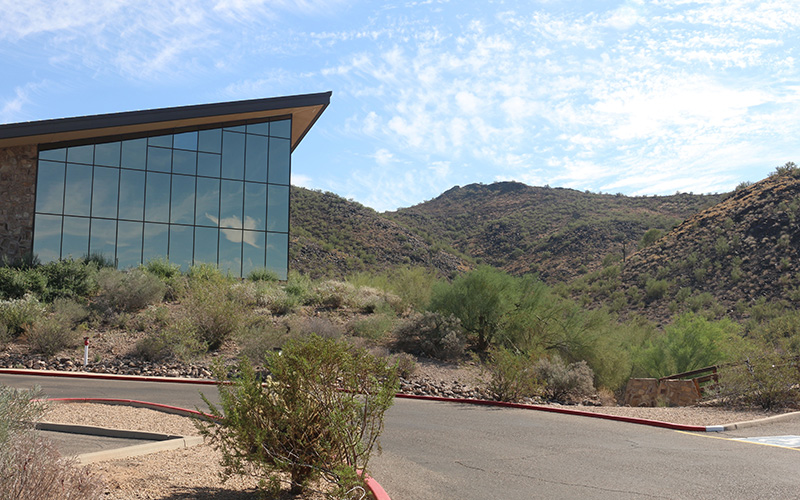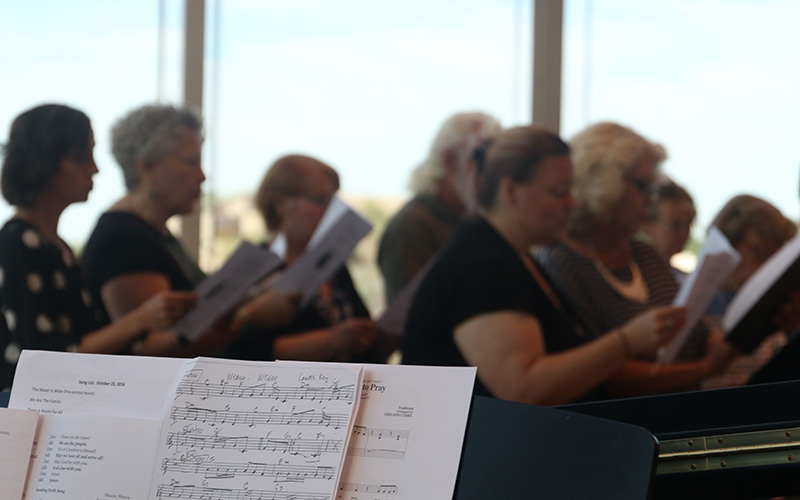
Shadow Rock United Church of Christ in north Phoenix offers sanctuary to undocumented immigrants facing deportation. (Photo by Courtney Columbus/Cronkite News)

Choir members sing during a Sunday service at Shadow Rock United Church of Christ in north Phoenix. (Photo by Courtney Columbus/Cronkite News)
PHOENIX – Ismael, a 46-year-old undocumented immigrant, accepted an offer of sanctuary from a north Phoenix church shortly after he received his deportation letter in August 2015.
The letter, from U.S. Immigration and Customs Enforcement, meant Ismael (he did not want his last name used in this story) would be deported from the United States in 60 days or less. He had lived in the United States for 25 years.
Desperate, he moved into the Shadow Rock United Church of Christ, where he has lived for more than a year in a room with a bulletin board he decorated with his favorite Bible verses written on Post-It notes.
Federal authorities generally avoid detaining people at places they identify as sensitive locations, including churches and schools, according to ICE policies referenced by a spokeswoman.
Rev. Ken Heintzelman, pastor of the Shadow Rock church, said the church has provided sanctuary to four immigrants, including Ismael and Sixto Paz, who currently reside in the church.
The church also provides temporary housing for immigrants who have been detained and released by federal authorities pending legal proceedings. Heintzelman said these requests for help come from the Phoenix Restoration Project, which finds temporary housing for undocumented immigrants that ICE deems ‘low risk’.
The Shadow Rock church is one of a handful reviving the 1980s church sanctuary movement pioneered in Tucson to shelter deportable immigrants fleeing violence in Central America.
Rev. Gene Lefebvre, 83, said he helped to found the sanctuary movement in Tucson churches in the 1980s. He collaborated with Rev. John Fife, pastor of Southside Presbyterian Church, which began offering sanctuary to undocumented immigrants in the early 1980s.
In 1986, Fife was convicted of conspiracy and two counts of aiding and abetting the illegal entry of immigrants. Five other religious leaders were also convicted. Fife didn’t serve any jail time, according to an interview with Democracy Now.
“We had no intention of resisting our government, we didn’t understand that was our role, but we weren’t going to let people die,” recalled Lefebvre in a recent interview.
Churches that offer sanctuary to immigrants today are subject to criticism from immigration hardliners, including Arizona legislator John Kavanagh.
“I would ask the churches, how do you know these people aren’t being deported because they committed serious crimes? When they’re not following legal processes, those kinds of mistakes are easy to make,” said Kavanagh, who represents District 8 in the Arizona House of Representatives.
“I don’t think they should break into the church and drag them out,” he said. “Let these people stay in the church. If they’re captured outside, they could be deported.”
It makes no sense to violate the sanctity of the church, Kavanagh said.
Heintzelman said not all church members initially supported the church’s decision to shelter immigrants, but more have grown sympathetic toward the cause in the past two years.
“We’ve seen the needle move at least one notch in the right direction,” he said, “from being against sanctuary to neutral, from neutral to being passively supportive, from being passively supportive to actively supportive.”
Ismael and Sixto Paz cook in the church kitchen, with food provided by their families during visits. They play pool or watch TV in the church rec room. Heintzelman said both men look for ways they can help the church in their free time. Once, they hosted a taco night for churchgoers, Heintzelman said.
Recent weeks have been especially difficult, Ismael said. He feels his immigration case is advancing too slowly. He sometimes wakes up feeling desperate and depressed. He said he received a warm, unexpected welcome from the church congregation. Small gifts like bread and soda carry a lot of value for him.
But the most difficult part is being separated from his family in Phoenix, Ismael said. He worries that his wife won’t tell him if she doesn’t have enough food because she wouldn’t want to add more stress to his life. A former chef at a golf club, he hasn’t been able to work since he started living at Shadow Rock.
He feels hopeful about the possibility that his immigration case will be reopened and positively resolved because two other immigrants who were given sanctuary at Shadow Rock both won their cases.
Ismael may not be able to leave the church anytime soon. He hasn’t given up on his immigration case, and said he applied for a special visa. But the application process can take more than a year, and his attorney is seeking a stay of deportation so Ismael can complete the visa application process.
Paz said he has lived in the United States for 32 years, and has lived at Shadow Rock for four months.
“Why be here, separated from everything I love, from everything that I’ve fought for, from everything that I am?” he said, fighting back tears.
Paz tries to stay positive. He hopes for changes to immigration reform that would allow him to stay in the United States.
“This is supposed to be a country of liberty,” he said. “Look at what’s happening.”